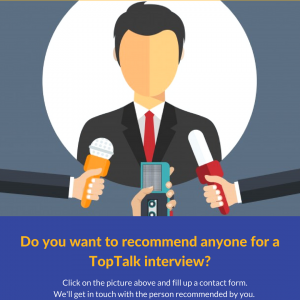 Dr. Robin Kiera living in Hamburg, Germany, is one of the most renown thought leaders in digital transformation and new work culture. Having worked in start-ups and corporates he knows both sides of the story. Besides giving key-notes around the world on digital trends and cultural change, Robin founded Digitalscouting.de – a platform for market insights, thought leaders and influencers. In addition, he leads the software- and product development at the digital subsidiary of a large private bank in Germany.
Dr. Robin Kiera living in Hamburg, Germany, is one of the most renown thought leaders in digital transformation and new work culture. Having worked in start-ups and corporates he knows both sides of the story. Besides giving key-notes around the world on digital trends and cultural change, Robin founded Digitalscouting.de – a platform for market insights, thought leaders and influencers. In addition, he leads the software- and product development at the digital subsidiary of a large private bank in Germany.
What does employee engagement mean to you?
In the last 10 years, technology companies have replaced a lot of traditional corporations from the list of the most valuable brands in the world. It’s quite striking that most tech companies have a totally different understanding of the role of their employee. While traditional companies – a lot of roots into the 19th or early 20th century – still struggle with a command and control culture, new tech companies can start fresh. For me, it seems that agile, open, transparent structures are one of the factors leading to the success of Google, Facebook, Amazon, Tencent, and Alibaba. Employee engagement, therefore, is an important part of this new corporate culture.
How to measure employee engagement?
We live in exciting times with technology our grandparents could not even imagine. On social media and employee sites, we are able to listen what our colleagues actually think about a corporation. One data-driven measure is – in my opinion – reviews of companies on the internet and on social media. In addition, there is a wide range of tools that are able to measure in a more traditional way employee engagement. For a start – to find out if my employees love or hate my company – I would start with the internet and social media though.
What are the common causes of employee disengagement?
Brian Fanzo (Twitter: @isocialfanz), one of the most capable social media experts I know, always says: “If you suck offline, you suck online.” I believe it’s crucial to provide employees a transparent and secure platform, to express their feedback and to promote them to do so – may it be internally, in workshops or in public. Disengagement is the last step in a long journey of a formerly motivated and productive employee. A lack of expressing feedback and seeing reasonable change is, in my opinion, one of the main reasons. To be honest: if your employees – may you be a team leader or CEO – are disengaged there is only one to blame: You – because you are responsible for providing these communication and change channels.
What are the drivers of employee engagement in today’s fast-moving world?
Every person is different. Nevertheless I made the experience, may it be in crisis threatening the existence of the company I worked for, in software- and product development or in large digital transformation projects: if there is a leader setting an example of motivation, dedication, and engagement, providing a vision and a goal to achieve and directing the way and providing the tools and a roadmap how to achieve it, most will follow and exceed expectations. I had colleagues with almost no formal education or no experience contributing crucially to results that board members defined as a miracle. The engagement of employees is one of the keys to the success of a company.
What makes a really effective employee engagement programme? Any best practices to share.
Instead of designing sophisticated processes and rules that enable a 19th century culture of command and control, its crucial to see the employee, not as the enemy that needs to be ruled and regulated, but as one of the keys to success. Treat them that way. I experience companies that did this. There were departments developing small and big perks to make the life of an employee easier. For example, it was allowed to send mail to the company. In a country in which post offices close at 6 pm, this is great. So you can work without thinking about the closing time of the post office. There was an open bar, free breakfast, and free coffee, opportunities to do sport. In a more conservative company I worked for employees were allowed to work 50% part-time when their parents needed fostering and continued to pay large parts of the salary – a lot more than 50% I actually just wrote an article about it in Startup-Valley-News.

1 thoughts on “Dr.Robin Kiera, Start-Up and Product Professional, Speaker, Author and Influencer”